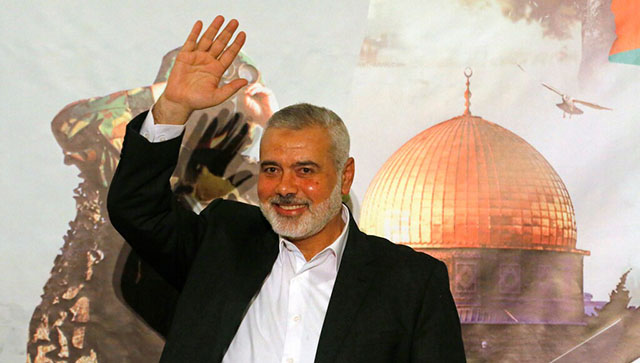In a noteworthy development, senior Hamas leader Ismail Haniyeh recently addressed an online event in Pakistan, seeking assistance from the South Asian nation. Haniyeh, a prominent figure in Hamas since the 7 October attacks, conveyed a message that suggested if Israel faced resistance from Pakistan, the perpetration of cruelty could cease.
Hamas’ outreach to Pakistan raises questions about the factors behind this appeal and the potential role Pakistan could play in the ongoing Israel-Palestine conflict. Haniyeh’s appeal and Pakistan’s historical support Ismail Haniyeh’s message said Pakistan is a brave nation and called it as the land of Mujahideen. This appeal stems from historical ties between Pakistan and Palestine, where Pakistan has consistently been a vocal critic of Israel, refusing to recognise the state and severing diplomatic relations. Past claims of Pakistan providing aid to Palestine and potentially training Hamas fighters add complexity to the relationship. While neither side officially confirms these allegations, a 2021 revelation by a Pakistani senator hinted at Islamabad’s historical support for Hamas. Public opinion and mass support in Pakistan Public sentiment in Pakistan overwhelmingly supports the Palestinian cause. A post-7 October attack poll indicated that 91 per cent of Pakistanis supported Hamas, while only 2 per cent expressed sympathy for Israel. Mass rallies in major cities like Karachi, Islamabad, Lahore and Rawalpindi demonstrated solidarity with participants vocally condemning Israel. Moreover, a widespread boycott campaign against companies perceived as supporting Israel, such as McDonald’s, Coca Cola and Pepsi, further underscores the public’s pro-Palestine stance. Pakistan’s changing position While Pakistan has a history of supporting Palestine, recent events suggest a shift in its stance. The caretaker prime minister expressed heartbreak over the violence following the 7 October Hamas attack, adopting a more cautious approach compared to other Muslim nations like Malaysia and Iran, which openly supported Hamas. This shift could be attributed to Pakistan’s current economic crisis and the need for international financial support, primarily from the US and the West. As geopolitical considerations come into play, Pakistan appears to be recalibrating its stance on the Israel-Palestine issue. Internal dynamics within Pakistan add complexity to the situation. While the public and Islamist parties like JUI-F and Jamaat-e-Islami express solidarity with Hamas, the establishment, including the military, may adopt a more cautious approach. The military, in a statement, pledged moral support for Palestine, but the practical impact of such support remains uncertain. Hamas’ appeal to Pakistan reflects the desperate need for support amid changing geopolitical dynamics. While Pakistan’s historical ties and public sentiment align with the Palestinian cause, internal divisions and external pressures may limit the extent of its involvement. As the conflict unfolds, the role Pakistan plays in the Israel-Palestine issue remains a nuanced and evolving aspect of the broader geopolitical landscape. Views expressed in the above piece are personal and solely that of the author. They do not necessarily reflect Firstpost’s views. Read all the Latest News , Trending News , Cricket News , Bollywood News , India News and Entertainment News here. Follow us on Facebook, Twitter and Instagram.


)

)
)
)
)
)
)
)
)



